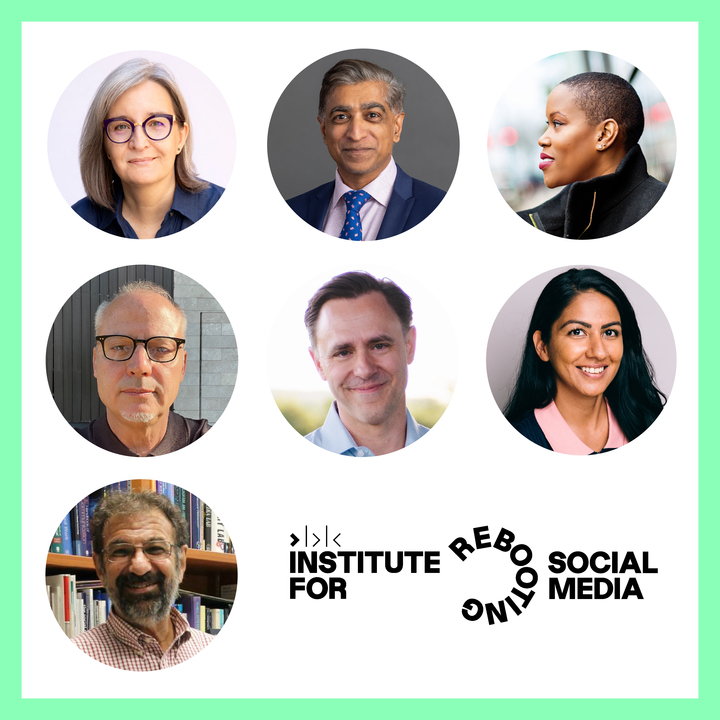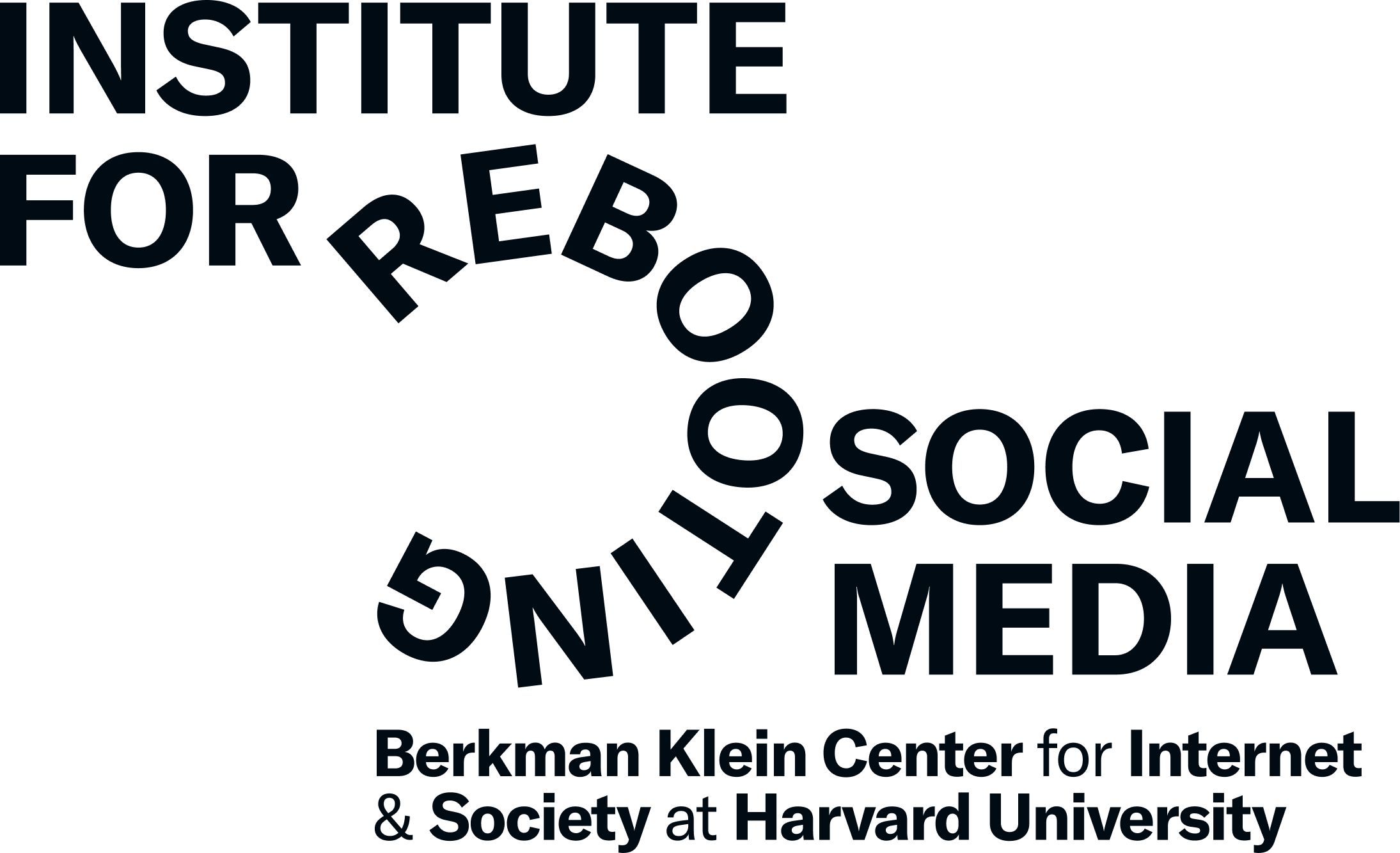


Announcing the Institute for Rebooting Social Media's 2023-2024 Visiting Scholars
The Institute for Rebooting Social Media is thrilled to announce its 2023-24 cohort of Visiting Scholars. These seven visiting faculty members will use their time with the Institute to investigate urgent social media problems and propose mitigations for harmful online phenomena.
The Berkman Klein Center’s Institute for Rebooting Social Media is thrilled to announce its cohort of Visiting Scholars for the upcoming 2023-2024 academic year. With backgrounds in communications studies, law, engineering, media studies, and political science, these seven visiting faculty members will use their time with the Institute to investigate urgent social media problems and propose mitigations for harmful online phenomena.
“While it’s hard to find anyone willing to go to bat for online discourse’s status quo, it’s also hard to flesh out self-sustaining, genuine alternatives,” said Jonathan Zittrain, co-director of the Institute for Rebooting Social Media. “But it’s so important to do so, and these scholars have been creatively and diligently painting bright, more humane futures for online connection.”
The past work of Lisa Austin, Anupam Chander, Meredith D. Clark, David Craig, Jeffrey Hall, Swati Srivastava, and Joe Walther has contributed to deeper theoretical and empirical understandings of online behaviors and the development of smarter regulatory interventions. With the Institute, these scholars will focus on topics such as the legal and geopolitical implications of platform regulation, the challenges of global-scale content governance, and the design mechanisms that encourage prosocial interactions or contribute to hate online.
“These scholars build on traditional focus areas of the Institute like regulation design and social graph analysis, but also bring new expertise in areas like the relationships between feminism and Black identity online,” said James Mickens, co-director of the Institute for Rebooting Social Media. “Over the next year, I think that these scholars will generate some amazing work at the intersection of social science, legal analysis, and computer science.”
The Visiting Scholars will spend a portion of the academic year in residence at the Berkman Klein Center’s home in the Reginald F. Lewis Law Center at Harvard Law School. In addition to their own projects, scholars will work with Harvard students, staff, and affiliates, and the broader Berkman Klein community, with the goal of producing research that is both academically rigorous and accessible to diverse audiences.
The Visiting Scholars Program is part of the Institute for Rebooting Social Media’s larger portfolio of programming, research, and educational opportunities. The selection committee for this year’s Visiting Scholar cohort included a combination of Harvard faculty and BKC staff: Gabriella (Biella) Coleman, James Mickens, Jonathan Zittrain, Rebecca Rinkevich, Jordi Weinstock, Sarah Newman, Rebecca Tabasky, Toni Gardner, and Nicholas Lindseth. The Institute and its programs are supported by generous contributions from the John S. and James L. Knight Foundation, Reid Hoffman, Craig Newmark Philanthropies, and Archewell Foundation.
About the 2023-2024 RSM Visiting Scholars
Lisa Austin is a legal scholar who is the Chair in Law and Technology at the University of Toronto and an Associate Director of the Schwartz Reisman Institute for Technology and Society. Her past research has focused on privacy law and private law theory, as well as interdisciplinary research in law and engineering. Her project at RSM will examine the potential role of data intermediaries in mediating data access between parties in the data ecosystem, and their place in an overall theory of data governance that aims to promote the fair and just terms of social legibility. @Lisa_M_Austin
Anupam Chander is the Scott K. Ginsburg Professor of Law and Technology at Georgetown University, the author of The Electronic Silk Road (Yale University Press 2013), and the editor (with Haochen Sun) of Data Sovereignty: From the Digital Silk Road to the Return of the State, forthcoming in November 2023 from Oxford University Press. His scholarship on international economic law, privacy, and speech has appeared in many of the nation’s leading law reviews. @AnupamChander
Meredith D. Clark, Ph.D. is an Associate Professor in the School of Journalism and the Department of Communication Studies, and director of the Center for Communication, Media Innovation and Social Change at Northeastern University. Her project centers Black women’s digital avatars to explore how sites and systems of disinformation capitalize on American misogynoir. @MeredithDClark
David Craig, USC Annenberg Clinical Professor, studies the rise of creator culture, which refers to how social media entrepreneurs harness platforms to build and engage communities for commercial, political, and sociocultural value. At RSM, he will focus on “Creators for Change”, a term borrowed from the now defunct YouTube program, to describe those creators who are explicitly aligned with and advocating for political, social justice, and cause-based efforts. Professor Craig will interrogate how creators navigate their commercial and cultural interests and engage their communities around these concerns on and across platforms, as well as their collaborative practices with activist and impact organizations throughout the political and sociocultural spectrum.
Jeffrey Hall is a Professor of Communication Studies at the University of Kansas. He studies the intersection of online and offline communication and is the author of Relating Through Technology. His research at the Institute will identify when and how social media promotes connection and relationships with the hope of creating guidelines for promoting digital well-being for everyone.
Swati Srivastava is an Assistant Professor of Political Science at Purdue University. She researches global governance, including political power and responsibility of Big Tech. Most recently, she is the author of Hybrid Sovereignty in World Politics (Cambridge University Press 2022). Her research has received awards from the National Endowment for the Humanities, Andrew Mellon Foundation, American Council of Learned Societies, and International Studies Association. As a Visiting Scholar, she will use original data to analyze how users and regulators have responded to Facebook’s content governance harms around the world, paying special attention to global North versus South divides. @swatisrivast
Joe Walther holds the Bertelsen Presidential Chair in Technology and Society, and is a Distinguished Professor of Communication at the University of California, Santa Barbara. He is a pioneering researcher in interpersonal and intergroup dynamics in mediated interaction, in personal relationships, groups, and inter-ethnic conflict. His Institute projects are focusing on new approaches to understanding social and technological factors that facilitate the generation and propagation of hate messaging in social media. @joewalther


